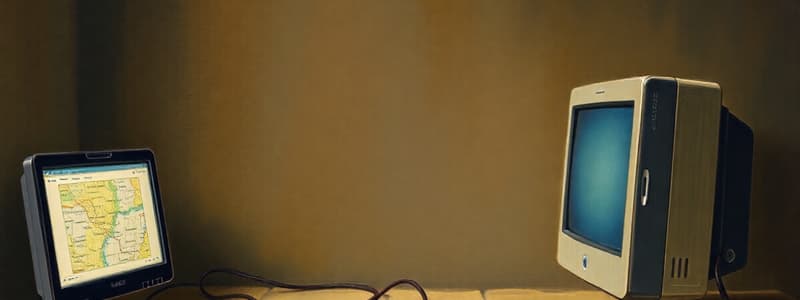Podcast
Questions and Answers
What is the key distinction between data and information?
What is the key distinction between data and information?
- Data and information are synonymous and can be used interchangeably.
- Data requires processing to become information, which is relevant and contextualized. (correct)
- Data is organized and contextually relevant, while information is unstructured.
- Information is simply a collection of facts, while data provides detailed context.
How is knowledge defined in relation to data and information?
How is knowledge defined in relation to data and information?
- Knowledge is unstructured data that can be analyzed for patterns.
- Knowledge is merely categorized data without a practical application.
- Knowledge comes from experience and allows individuals to evaluate new inputs. (correct)
- Knowledge is identical to information and is used for data processing.
Which of the following describes a personal computer?
Which of the following describes a personal computer?
- A computing device specifically made for online gaming and streaming.
- A small, single-user computer based on a microprocessor with essential peripherals. (correct)
- A high-end computer designed for graphic-intensive applications and tasks.
- A powerful, multi-user computer capable of supporting hundreds of users.
What defines a workstation compared to a personal computer?
What defines a workstation compared to a personal computer?
Which type of computer supports multiple users simultaneously, making it different from personal and workstation computers?
Which type of computer supports multiple users simultaneously, making it different from personal and workstation computers?
What distinguishes a supercomputer from a mainframe?
What distinguishes a supercomputer from a mainframe?
Which of the following characteristics is unique to tablet computers compared to laptops?
Which of the following characteristics is unique to tablet computers compared to laptops?
What is the primary focus of a netbook compared to a standard laptop?
What is the primary focus of a netbook compared to a standard laptop?
Which of the following is true about smartphones compared to other mobile devices?
Which of the following is true about smartphones compared to other mobile devices?
What is a defining feature of mainframe computers?
What is a defining feature of mainframe computers?
Flashcards are hidden until you start studying
Study Notes
Computer Types
- Mainframe: Capable of supporting hundreds to thousands of users simultaneously, very powerful
- Supercomputer: Executes millions of instructions per second, incredibly fast
- Laptop: Portable, AC or battery-powered personal computer, typically has similar functionality to desktops, some sacrifice functionality for portability
- Netbook: Highly portable, cheaper than desktops or laptops, less processing power but suitable for internet use and email
- Mobile Device: Handheld computers with varying levels of processing power, some can do tasks like desktops or laptops
- Tablet Computer: Portable, touch-sensitive screen for interaction, optimized for media consumption and web browsing, use virtual keyboard
- Smartphone: Powerful mobile phone with app capabilities, essentially small tablet computers
Introduction to Computers
- A machine that processes, calculates, and performs operations based on software or hardware instructions
- Accepts data (input), processes it, and produces information (output)
- Stores data for later retrieval
- Used for various purposes: web browsing, document creation, video editing, game playing, etc.
Basic Concepts of Computer
- Electronic device for storing and processing data, providing fast and accurate results
Data, Information, and Knowledge
- Data: Unstructured facts and figures, lacking context or organization
- Information: Data with relevance and purpose, contextualized, categorized, and calculated
- Knowledge: Implies understanding and know-how, shaped by individual experience and used to evaluate new information
Computer Classification
- Personal Computer (PC): Small, single-user, based on a microprocessor
- Workstation: Powerful, single-user computer, more powerful microprocessor and high-quality monitor than PC
- Minicomputer: Multi-user, supports 10 to hundreds of users simultaneously
Computer Components
- Scanner: Input device for scanning documents into soft copies
- LCD (Liquid Crystal Display): Output device, used as a monitor
- Motherboard: Combination of electronic circuits
- Sound Card: Electronic circuits for sound output
- Graphics Card: Electronic circuits for visual output to the monitor
Computer Software
- Software: Logical programs for handling and problem-solving
- System Software: Manages the entire computer system
- Application Software: Designed to solve a specific problem
- Embedded Software: Integrated with hardware for specific tasks
- Proprietary Software: Requires purchase for use, vendor-controlled
- Open Source Software: Freely available, modifiable, and reusable under the same license
Characteristics of Computers
- Speed: Incredible processing speed, far exceeding human capabilities
- Accuracy: High level of accuracy, errors are typically due to human factors (data input, program design)
- Diligence: Consistent and tireless, capable of processing vast amounts of data without breaks
- Versatility: Adaptable to a wide range of tasks and applications
- Storage Capacity: Stores large amounts of data for later use
Studying That Suits You
Use AI to generate personalized quizzes and flashcards to suit your learning preferences.




